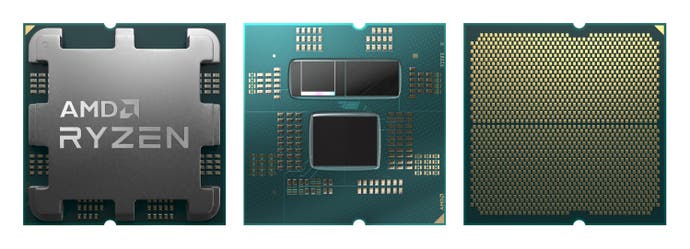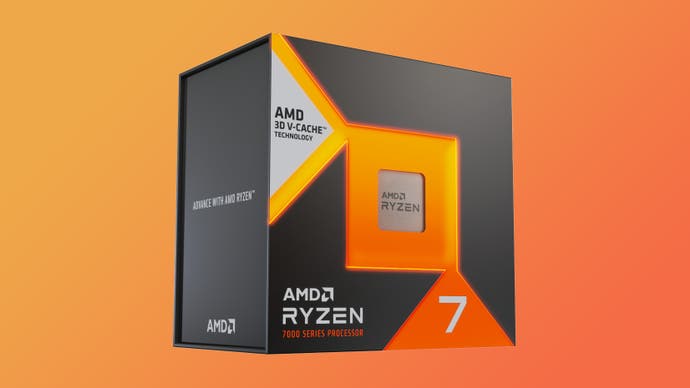AMD Ryzen 7 7800X3D review: faster than 13900K and 7950X3D for gaming?
The 5800X3D follow-up takes on the Intel and AMD flagships in a three-way shootout for the gaming crown.
The one that we've been waiting for is here. The $449 Ryzen 7 7800X3D processor promises to deliver similar gaming performance to AMD's flagship 7950X3D and Intel's Core i9 13900K, while consuming less power and costing significantly less than its rivals. To find out which of these three options is the fastest gaming CPU on the market, we've started a shootout - and tested each option fresh in nine of the most challenging CPU-limited scenarios, from modern games that soak all available threads to ray tracing showcases and esports titles.
Our expectations for the 7800X3D are high - after all, the CPU's design permits its full 120W TDP to be dedicated solely to an eight-core chiplet complete with performance-boosting 3D V-Cache. By comparison, the 7950X3D and 7900X3D released in February split that power budget across two chiplets, only one equipped with the extra L3 cache, so we could potentially see even greater performance than these CPUs. It's a similar story to the Intel Core i9 13900K, a fantastic gaming and content creation CPU - but one that relies on scheduling algorithms built into Windows to make full use of its asymmetric performance core and efficiency core design.
Even getting close to its rivals in terms of frame-rate could put the 7800X3D in the same hallowed tier as the legendary 5800X3D, a reasonably affordable mid-range CPU that punches well above its weight and even challenges Intel's equivalent-generation flagship parts.

You can see how the 7800X3D fits into AMD's Zen 4 lineup in the table below. As a reminder, each of these Ryzen 7000 desktop designs benefits from a range of advances over their Ryzen 5000 (Zen 3) counterparts, with a quoted 13 percent uptick to instructions-per-clock (IPC) and more internal improvements, like an improved execution engine and a better branch predictor. There's also DDR5 and PCIe 5.0 support, with 5nm CCDs and a 6nm I/O die, alongside the new AM5 socket which unlocks additional power and performance - albeit with the requirement of a new motherboard, new RAM and potentially new cooling.
| CPU design | Boost | Base | L3 cache | TDP | RRP | |
|---|---|---|---|---|---|---|
| Ryzen 9 7950X3D | Zen 4 16C/32T | 5.7GHz | 4.2GHz | 128MB | 120W | $699/£699 |
| Ryzen 9 7950X | Zen 4 16C/32T | 5.7GHz | 4.5GHz | 64MB | 170W | $699/£739 |
| Ryzen 9 7900X3D | Zen 4 12C/24T | 5.6GHz | 4.4GHz | 128MB | 120W | $599/£599 |
| Ryzen 9 7900X | Zen 4 12C/24T | 5.6GHz | 4.7GHz | 64MB | 170W | $549/£579 |
| Ryzen 9 7900 | Zen 4 12C/24T | 5.4GHz | 3.7GHz | 64MB | 65W | $429/£519 |
| Ryzen 7 7800X3D | Zen 4 8C/16T | 5.0GHz | 4.2GHz | 96MB | 120W | $449/TBA |
| Ryzen 7 7700X | Zen 4 8C/16T | 5.4GHz | 4.5GHz | 32MB | 105W | $399/£419 |
| Ryzen 7 7700 | Zen 4 8C/16T | 5.3GHz | 3.8GHz | 32MB | 65W | $329/£349 |
| Ryzen 5 7600X | Zen 4 6C/12T | 5.3GHz | 4.7GHz | 32MB | 105W | $299/£319 |
| Ryzen 5 7600 | Zen 4 6C/12T | 5.1GHz | 3.8GHz | 32MB | 65W | $229/£249 |
For our testing, we're using the same basic setup as our Ryzen 7950X3D review. That means an ASRock X670E Taichi motherboard, G.Skill Trident Z5 Neo DDR5-6000 CL30 RAM and Asus' RTX 3090 Strix OC for our graphics card. Cooling is provided by a 240mm Alphacool Eisbaer Aurora AiO, which is happily still compatible with the AM5 socket.
For storage, we're using three PCIe 4.0 NVMe SSDs to hold all of our games - a 4TB Kingston KC3000, a 1TB PNY XLR8 CS3140 and a 1TB Crucial P5 Plus. Our rig was completed with a 1000W Corsair RM1000x power supply.
We've previously used an older version of Windows, 21H2, to maintain compatibility with past benchmarks, but this time we've thrown out the old results and tested afresh - with the latest Windows updates, chipset drivers and BIOS revisions installed. That means BIOS version version 1.18.1006 for the ASRock X670E Taichi motherboard that hosts our AMD processors and BIOS revision F8a for the Z790 Aorus Master board socketing the 13900K.
Before we get into the gaming benchmarks that make up pages two to six, let's quickly run through some quick content creation benchmarks: a Cinebench R20 3D render and a Handbrake video transcode. These results are useful even in a gaming context as they set expectations for both single-core and multi-core performance in scenarios where the extra cache provides no advantage - and you may well want to occasionally export a video clip of your sick Counter-Strike 2 clutches.
In the single-core and multi-core results, we see about 10 percent faster results on the 7700X versus the 7800X3D, which has the same basic eight-core, 16-thread design as the new chip but at higher frequencies as it doesn't need to accommodate the 3D V-Cache. That corresponds to the 7800X3D scoring 706 for single-core and 7108 for multi-core in Cinebench R20 compared to 768 and 7894 respectively for the 7700X.
| CB R20 1T | CB R20 MT | HB h.264 | HB HEVC | HEVC Power Use | |
|---|---|---|---|---|---|
| Ryzen 9 7950X3D | 788 | 13807 | 95.73fps | 40.70fps | 232W |
| Ryzen 9 7950X | 798 | 14837 | 105.15fps | 45.10fps | 368W |
| Ryzen 9 7900X | 791 | 11324 | 79.38fps | 33.77fps | 288W |
| Ryzen 7 7800X3D | 706 | 7108 | 52.99fps | 23.14fps | 190W |
| Ryzen 7 7700X | 768 | 7894 | 56.69fps | 25.95fps | 266W |
| Ryzen 5 7600X | 750 | 6063 | 44.35fps | 20.28fps | 236W |
| Ryzen 5 7600 | 706 | 5632 | 41.09fps | 18.72fps | 196W |
| Ryzen 9 5950X | 637 | 10165 | 70.28fps | 30.14fps | 237W |
| Ryzen 7 5800X3D | 546 | 5746 | 42.71fps | 19.10fps | 221W |
| Ryzen 7 5800X | 596 | 6118 | 44.18fps | 19.50fps | 229W |
| Ryzen 5 5600X | 601 | 4502 | 31.75fps | 14.43fps | 160W |
| Core i9 13900K | 873 | 15570 | 104.67fps | 41.20fps | 473W |
| Core i5 13600K | 767 | 9267 | 62.37fps | 26.44fps | 254W |
| Core i9 12900K | 760 | 10416 | 70.82fps | 29.26fps | 373W |
| Core i7 12700K | 729 | 8683 | 57.64fps | 25.67fps | 318W |
| Core i5 12600K | 716 | 6598 | 44.27fps | 19.99fps | 223W |
| Core i5 12400F | 652 | 4736 | 31.77fps | 14.70fps | 190W |
| Core i9 11900K | 588 | 5902 | 41.01fps | 18.46fps | 321W |
| Core i5 11600K | 541 | 4086 | 29.00fps | 13.12fps | 250W |
That doesn't sound great, but it's a relatively minor performance penalty given the large uptick in gaming performance we expect to see later. For context, that still puts the 7800X3D well ahead of the last-gen 5800X, by a 16 percent margin; versus the 5800X3D we're looking at nearly 25 percent better multi-core performance.
The Handbrake results are perhaps more relevant to the average game-enjoyer, and here the margins from 7800X3D to 7700X are a bit tighter for the H.264 encode - just seven percent - and a bit looser for the H.265 (HEVC) encode at 12 percent. However, the 7800X3D does accomplish this while using significantly less power than the 7700X, at just 190W measured at the wall compared to 266W for the 7700X - that's 40 percent more power for the older Ryzen 7000 eight-core chip.
Now, let's get into the meat and potatoes of our testing - a range of games that test the CPU in different ways. Pick out your favourites from the links below or just hit the next page button to continue.
AMD Ryzen 7 7800X3D analysis
- Introduction, test rig and content creation benchmarks [this page]
- Gaming benchmarks: Flight Simulator 2020, Hitman 3, Ashes of the Singularity
- Gaming benchmarks: Counter-Strike: GO, Metro Exodus EE, Black Ops Cold War
- Gaming benchmarks: Cyberpunk 2077, Far Cry 6, Crysis 3 Remastered
- AMD Ryzen 7 7800X3D: the Digital Foundry verdict
Digital Foundry specialises in technical analysis of gaming hardware and software, using state-of-the-art capture systems and bespoke software to show you how well games and hardware run, visualising precisely what they're capable of. In order to show you what 4K gaming actually looks like we needed to build our own platform to supply high quality 4K video for offline viewing. So we did.
Our videos are multi-gigabyte files and we've chosen a high quality provider to ensure fast downloads. However, that bandwidth isn't free and so we charge a small monthly subscription fee of £4.50. We think it's a small price to pay for unlimited access to top-tier quality encodes of our content. Thank you.
Support Digital Foundry














